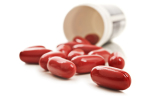- FreeTrainers.com Forums
- Health Supplements
- To Much Glutamine?
Group: Health Supplements
Created: 2012/01/01,
Members: 102,
Messages: 16613
Supplements can be a great aid with your health and fitness goals. Combined with the proper exercise and nutritional plan they can be quite effective.
Join group
To Much Glutamine?

David1201086
Posts:
253
Joined: 2004/06/15  |
2005/04/18, 07:21 PM
I was wondering if you can consume to much glutamine? How much should you take in on a daily basis?
|
|
| |
|
2005/04/19, 06:39 AM
take 5grams after an intense workouts with creatine...
don't take more than 10grams for sure... | |

gym_bunny
Posts:
7
Joined: 2005/04/03  |
2005/04/19, 11:30 AM
Usage level really depends on each person and their personal needs. A minimum of 5 grams and a maximum of 30-40 grams per day depending on your personal nutritional needs.
There hasn't been any conclusive studies showing that too much glutamine can be taken but some people did suffer from liver or kidney problems. -------------- *..::: Instead of giving myself reasons why I cant, I give myself reasons why I can! :::..* |

bb1fit
Posts:
11,105
Joined: 2001/06/30  |
2005/04/19, 11:36 AM
Glutamine will not hurt you in any way, and may well be effective for overtraining. It really may be best for its immune system benefits. Anyway it goes, it will not hurt you. If you are going to use it(and I believe it is better utilized if cutting), then optimal times would be after training, before bed, and first thing in the morning.-------------- If you don't stand for something, you will fall for anything.... bb1fit@freetrainers.com |

davidday
Posts:
79
Joined: 2005/01/28  |
2005/04/19, 01:44 PM
Holy crap! I take 40 grams every day. I usually throw it in a shake and I'm good to go. BB1 says it will not hurt me, so maybe the only thing I'm hurting is my wallet. And what about Glutamine NOS? Any benefits there? -------------- Dave ---------------------------------------- Eu procuro um amor que seja bom para mim... |

bropie
Posts:
1,084
Joined: 2004/12/04  |
2005/04/19, 03:31 PM
so whatre we saying here.. 5 grams in mornin, 5 after workout, and 5 at night? i know if any, getting the after workout would be the best..
|

rev8ball
Posts:
3,081
Joined: 2001/12/27  |
2005/04/19, 04:42 PM
BB1 is right. Glutamine is one of those "conditionally essential amino acids" that your body can't and won't hold on to. If you don't use it, you get rid of it as waste.-------------- Michael Nothing personal.... Strictly business. |

DX14AG
Posts:
1,055
Joined: 2004/07/22  |
2005/04/19, 09:00 PM
So what about the nutritional information on Glutamine. I've been training for a while and I think I'm going to start taking it. I want to broaden my knowledge about this stuff before I start taking it. Does it have any calories? Carbs protein fat?
DX |
|
2005/04/19, 09:43 PM
I don't know 40 grams sounds extreme...I mean I could possibly understand Ronnie Coleman using that much just because he's so massive and lifts so heavy..but for a beginning/intermediate lifter seems like very excessive amount...
you get 4 calories per gram of glutamine...it's basically a protein....proteins have amino acid make up...and depending on the food...it has different ratios of amino acids....no fat/carbs lutamine amino acid information Glutamine is a non-essential amino acid and is found in large amounts in the muscles of the body, and since it easily pass through the blood-brain barrier, it is also known as a superb brain fuel, and some people refer to it as a “smart-vitamin” – although it is in actual fact no vitamin at all. required for It is converted to glutamic acid in the brain, which is essential for cerebral functions, and increases the amount of GABA (gamma-aminobutyric acid), which is required for brain functioning and mental activity. It is used in the muscles for the synthesis of muscle proteins, and is of use for the treatment of wasting muscles after illness or post-operative care. Although the body requires nitrogen, free nitrogen in the body can be harmful since it form ammonia – specially toxic to the brain. The liver normally converts ammonia to urea, excreted in the urine – but glutamic acid attaches itself to nitrogen and forms glutamic acid, while removing ammonia from the brain. It further is used in the body to balance the acid/alkaline level and is also the basis or building blocks of RNA and DNA. It serves as a source of fuel for cells lining the intestines and it is also used by white blood cells and is important for immune function. deficiency indications Deficiency of this nutrient is rare, since it can be manufactured by the body but deficiencies can develop during periods of fasting, starvation, strict dieting, cirrhosis, and weight loss associated with AIDS and cancer. dosage The dosage listed is the Recommended Daily Allowance (RDA), but be aware that that this dosage is the minimum that you require per day, to ward of serious deficiency of this particular nutrient. In the therapeutic use of this nutrient, the dosage is usually increased considerably, but the toxicity level must be kept in mind. >In the presence of good health, supplementation of glutamine should not be necessary. toxicity and symptoms of high intake No clear toxicity has emerged in glutamine studies, but it should not be taken by people suffering from liver or kidney problems. extra needed when and if People suffering from arthritis, fibrosis, connective tissue disease, peptic ulcers, ulcerative colitis, as well as epilepsy, fatigue, impotence and senility may find benefit from an increase of this nutrient, as well as people busy with alcohol abuse withdrawal and patients living with HIV. other interesting points Monosodium glutamate (MSG), a salt of glutamic acid, is sometimes used as a condiment for flavoring foods. It imparts no flavor of its own, but enhances the flavors of meats, fish, and vegetables. Some people have an allergic reaction to MSG’s, and should be avoided by such individuals. L-glutamine supplements are also referred to as “smart drugs” since it is thought to improve the functioning of the brain. In animal research, glutamine has anti-inflammatory effects. Glutamine also decreases the craving for sweets and sugar, which is beneficial to people wishing to loose weight. glutamine found in food sources Glutamine is found in many high protein foods, such as fish, meat, beans, and dairy as well in vegetables such as raw parsley and spinach. from http://www.zestrsa.co.za/products/info/glutamine-info.htm | |

2fingers
Posts:
166
Joined: 2005/02/23  |
2005/04/30, 09:44 PM
menace,
thanks for posting that info. |

DX14AG
Posts:
1,055
Joined: 2004/07/22  |
2005/05/01, 09:06 PM
Thank you, Menace, for posting that information. It's very helpful and it influences me to start taking Glutamine. Which do you prefer? What brand? This question is open to everyone. Please list your preferred brand and why.
DX |

ctcrystalcat
Posts:
36
Joined: 2009/07/15  |
2009/12/19, 08:17 AM
I was wondering if anyone knows if Glutamine could cause high blood presure. I have never had high BP and out of blue it was so high. Got meds to get it down. was Told to go off them in maybe a month.
Well 2 weeks of feeling fine and still on meds with 2 weeks to go and I started taking my gluatmine again, and headache is back which tells me my BP is up as thats what sent me to the doc to begin with. im so upset with this. the head ache keeps me from working out hard. I mean I have to down shift weights by almost half. Ugg!! Any one know? I will research too, just thought someone might have went through the reserch already. |

ctcrystalcat
Posts:
36
Joined: 2009/07/15  |
2010/02/18, 02:47 PM
To those of you who may have read previous post. I am doing great and bp is down and im still taking the glutamine. It was just a fluke thing getting the high bp, stress in my opinion. Nothing to do with the glutamine.... My bp seems to stay down now and no medication at all. Yahoo!!!!!!!
|
